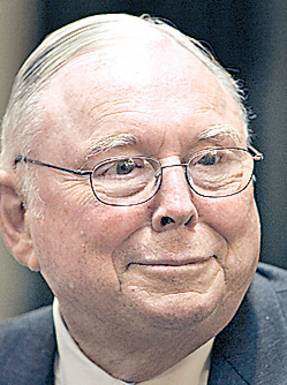Berkshire’s No. 2 happy to remain in background
Published 5:00 am Saturday, May 17, 2008

- Charlie Munger
PASADENA, Calif. — The two men who run Berkshire Hathaway Inc. have an arrangement: Warren Buffett is the face of the company, and Charlie Munger stays mainly in the shadows.
That works well for the two billionaires, who together have developed one of the most successful investment records ever.
But while Munger downplays his contributions — he is known for repeating “I have nothing to add” after Buffett’s expansive comments at Berkshire shareholder meetings — his role is key to much of the company’s success.
Buffett credits Munger with pushing him beyond his early strategies and says the two men have never had an argument — although they occasionally disagree.
Munger’s influence as vice chairman of Berkshire is considerable, but mostly private.
“He strikes me as somebody who is just a very good sounding board for Warren,” said Morningstar analyst Justin Fuller.
Berkshire’s board has a plan in place to select a new management team for the time when Buffett and Munger are gone, but whoever takes over the company will have a hard time matching their success and synchronicity.
Munger answers questions alongside Buffett for hours each May at the Berkshire shareholders meeting in Omaha, Neb., and again on his own at the annual meeting in California of Wesco Financial Corp., a Berkshire subsidiary that he leads.
Buffett sometimes relies on Munger to repeat questions because his hearing is better. After one shareholder asked a lengthy question this year about how Buffett got started investing and what mind-set an investor should have, Buffett turned to Munger for help.
So Munger summed it up: “He wants you to instruct him how to become less like a lemming.”
When Munger does weigh in, he often cuts through Buffett’s longer answer to its heart. And sometimes he critiques Buffett’s response.
“Well, that was real useful advice,” Munger said this year after Buffett answered a question about choosing good managers by saying Berkshire buys businesses with strong management teams in place. Then he compared that to saying the best way to get through lean times is to keep a couple million dollars lying around.
He can get away with rebuking the world’s richest man because they’ve been friends for nearly 50 years.
Munger, who at 84 is seven years older than Buffett, grew up in Omaha about five blocks from Buffett’s current home. Both men worked at the grocery store Buffett’s grandfather and uncle ran.
By the time they met at an Omaha dinner party in 1959, Munger was practicing law in Southern California and Buffett was running an investment partnership in Omaha.
“We hit it off,” Buffett said. “We were soon rolling on the floor laughing at our own jokes.”
The real key to Berkshire’s success, Munger said, is that he and Buffett like learning and have improved over time. But Munger gives Buffett most of the credit.
“Mr. Buffett is by far the most important person,” Munger said in an interview. “And to a huge degree why Berkshire Hathaway is the length and shadow of Warren Buffett.”
Munger compares his role at Berkshire with that of Albert Einstein’s professional colleagues.
“Practically everybody works better when not in extreme isolation,” Munger said. “If Einstein had worked in total isolation, he would not have been as productive as he was. He didn’t need a great deal of contact with other colleagues, but he needed some.”
But Buffett credits Munger with pushing him beyond value investing.
“Charlie has taught me a lot about valuing businesses and about human nature,” Buffett said.
Munger has always been modest about his role at Berkshire, and has been willing to avoid most of the limelight, said Andy Kilpatrick, the stockbroker-author of “Of Permanent Value, the Story of Warren Buffett.”
“It’s not easy to get two superegos to run something and one of them take the front seat totally and the other take the back seat,” Kilpatrick said. “I think he’s probably been a huge input all along and hasn’t tried to claim it.”






